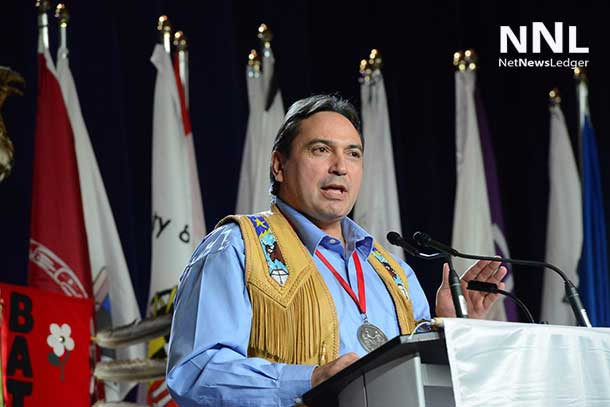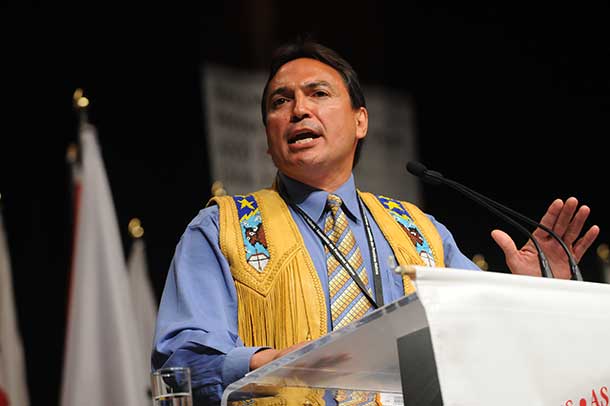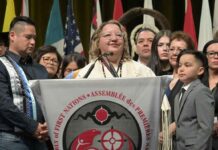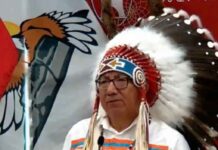
By AFN National Chief Perry Bellegarde
OTTAWA – First Nations hold a long-term vision of a renewed nation-to-nation relationship with Canada. This vision is supported by a practical approach that builds a stronger country for all of us.
Our priorities include movement on those steps, but there are two areas that we can and must move on immediately, areas where Canada’s own courts are demanding action. The first is ending discrimination in the First Nations child welfare system. The Canadian Human Rights Tribunal has already ruled the discrimination exists and must end. The long-term work is underway, but while this happens Parliament has already voted unanimously for an immediate infusion of $155 million into the system, and to honour Jordan’s Principle. That must happen now. Our children need that support. We look to Budget 2018 to fully eradicate this discrimination.
The other area is to immediately and fully end gender discrimination in the Indian Act as ordered by the court in the Descheneaux decision. First Nations are calling on Canada to repeal the problematic section 6 of the Indian Act in favour of First Nations’ authority over First Nations’ citizenship and identity and to meet its constitutional obligations to consult and accommodate on the required changes.
As the fall session of Canada’s 42nd Parliament resumes, First Nations leaders will be watching closely and working intently to ensure progress is made on a number of other key, critical fronts.
- Action on the United Nations Declaration on the Rights of Indigenous Peoples.
A top priority is to lay the groundwork for the full and meaningful implementation of the United Nations Declaration on the Rights of Indigenous Peoples. First Nations were encouraged when Canada accepted the advice of the Truth Reconciliation Commission of Canada (TRC) that the Declaration must be the framework for reconciliation. It is also worth noting that Canada has obligations under several UN resolutions to work in partnership with Indigenous peoples to develop a National Action Plan to ensure the full implementation of the UN Declaration. It is time for commitments to be translated into action. A place to start is a federal legislative framework to support and act on Canada’s international commitments to respect Indigenous peoples’ rights. We can build on the Private Members Bill introduced by NDP MP Romeo Saganash. Let this be the year that sees all federal parties work in a non-partisan way with Indigenous peoples on a Bill to ensure there is action on Canada’s human rights obligations to Indigenous peoples. It is time to seriously discuss a statutory foundation to support the implementation of the UN Declaration in Canada.
- Launching a joint Federal law and policy review.
On February 22 of this year, Prime Minister Trudeau announced the establishment of a Working Group of Ministers tasked with reviewing the laws and policies that impact the rights of Indigenous peoples. The establishment of a joint process for the review of federal law, policies and operational practices was a priority identified in the memorandum of understanding between the Assembly of First Nations and the federal government this past June.
Any effort to bring about change requires the direct involvement of First Nations who are experts in the impacts of colonialism, the inequities embedded in the law and in fiscal arrangements blocking progress in socio-economic outcomes and the exercise of our right to self-determination. First Nations are intent on achieving a better future for our children. We are working daily to implement our priorities, laws, and rights.
The task ahead is transformative but the opportunity to get started is here. We should not underestimate our capacity for positive change and partnership.
- Recognizing, Protecting and Revitalizing Indigenous Languages.
Last December, Chiefs from across this land applauded the Prime Minister’s expression of support for an Indigenous Languages Act, to be co-developed with Indigenous peoples. This is another key call to action of the TRC. All languages matter. Language rights are human rights, as confirmed by the UN Declaration on the Rights of Indigenous Peoples in several articles supporting the recovery, revitalization, preservation and maintenance of Indigenous languages. It is incumbent upon all governments in Canada to undo the damage done by the Indian Residential School system, the Indian Act, the Sixties Scoop and the overall policy of assimilation. Provincial policies must make space for Indigenous languages and curricula.
This June, the Honourable Mélanie Joly, Minister of Canadian Heritage, launched a Co-development Table and throughout the summer the AFN held a series of regional engagement sessions with language champions, linguists, educators and Elders. The sessions will conclude with a national meeting in Gatineau on October 18 and 19.
There are already concerted efforts underway across this land to maintain and strengthen languages among First Nations – despite immense challenges. After decades of suppression and neglect of Indigenous languages, it is clear that substantial investments will be needed over the long term to produce fluent speakers and support the meaningful use of our languages in our daily lives, our ceremonies, and the operations of First Nations governments and the interactions of Indigenous peoples with public institutions where possible.
- Closing the socio-economic gap
Properly supporting essential government services for First Nations in areas such as education, health, emergency services, housing and infrastructure, is a challenge that must be met. We can achieve a better future for everyone. We live in a time that affords us revolutionary opportunities to develop strategies for economic growth that advance reconciliation and help to ensure a liveable climate and a healthy economy. Moving forward together will require acknowledging and acting on the linkages between economic wellbeing, Indigenous rights, and the need for climate change action. On October 3, First Ministers will meet with Indigenous leaders to discuss the economy and, as we do, we will be mindful that Canada’s economy relies on growth made possible by abundant resources, labour and capital. Growth in resource wealth was estimated to be $650 billion dollars over 10 years in 2014. This will require that Canada respect the rights framed in the UN Declaration, the Constitution and international law and work in real partnership with First Nations on sustainable development.
On the labour side, we are the youngest and fastest growing demographic in Canada. It is estimated that up to 70 per cent of labour force growth will be First Nations over the next 20 years. If Canada’s economy is going to grow, supporting First Nations participation in the labour market is essential. This means closing the socio-economic gap through investments in education, housing, clean water and health care. Infrastructure investments that enhance productivity are fundamental, including renewable energy generation, telecommunications, roads and housing. Finally, a new fiscal relationship that empowers First Nations governments to deliver these results for their citizens is fundamental to all of this growth.
A legislative framework for implementation of the UN Declaration on the Rights of Indigenous Peoples. Ensuring Canada’s laws, policies and practices are in harmony with the UN Declaration. Moving on an Indigenous Languages Act. And making the right investments to close the gap and secure a better future for all. I look forward to the work ahead with First Nations leadership from across Canada and with all of our partners in government, allies in civil society organizations, and all walks of life through the coming session of Parliament, and beyond.
Reprinted with permission from the Hill Times






